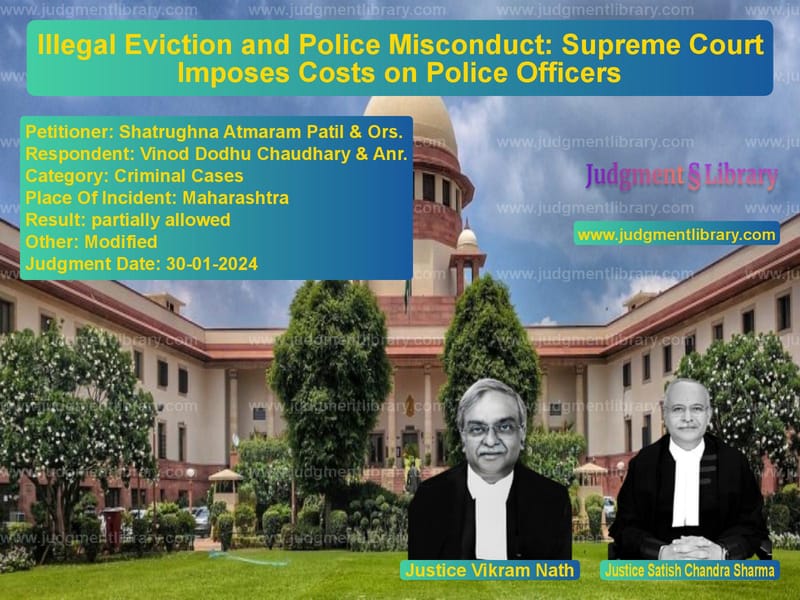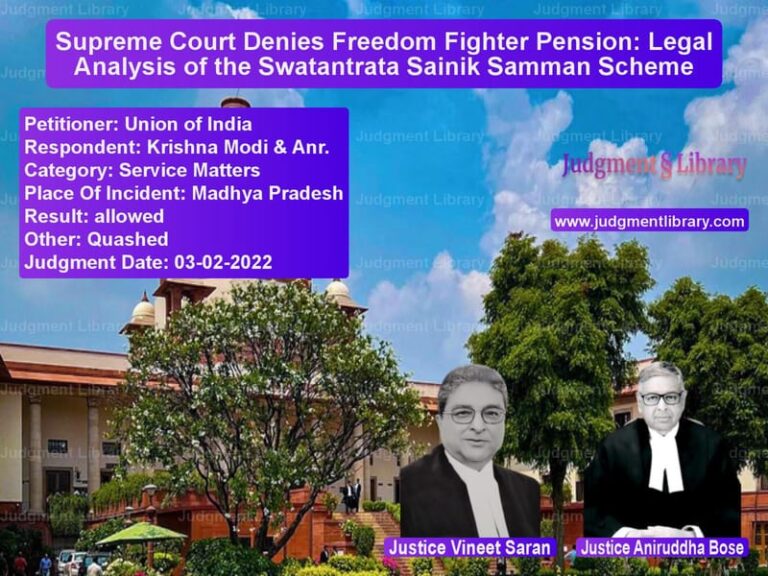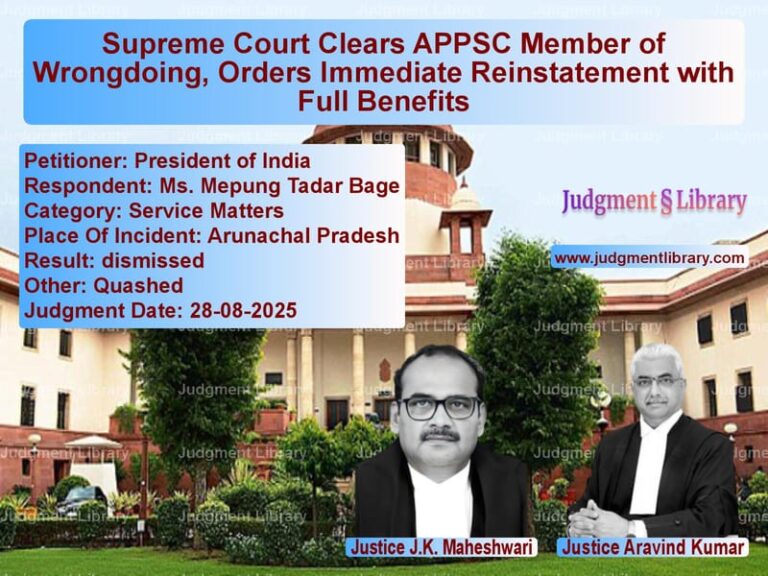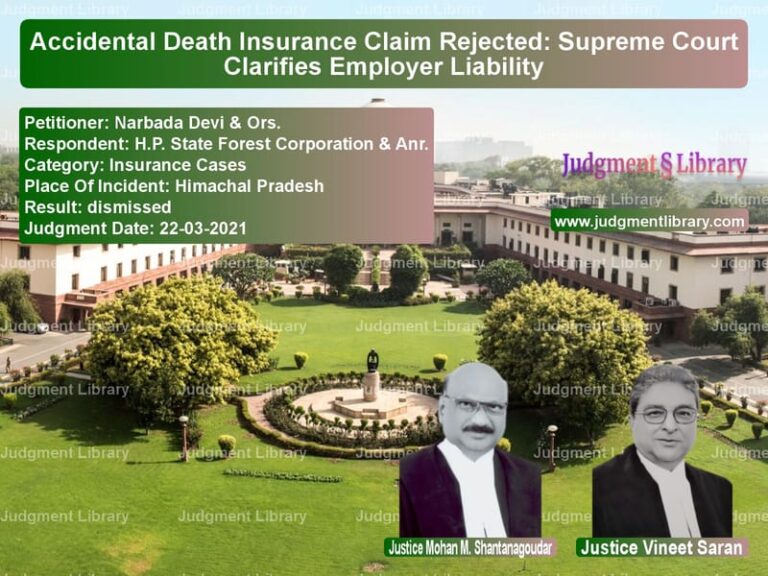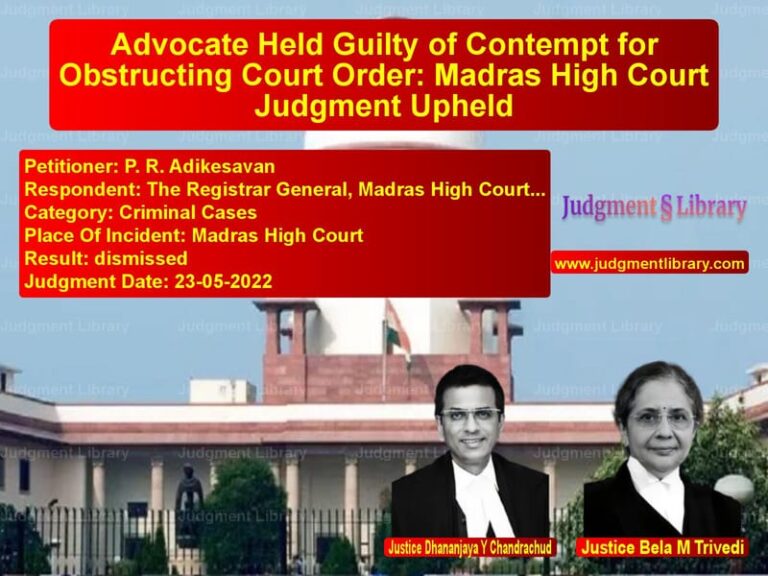Illegal Eviction and Police Misconduct: Supreme Court Imposes Costs on Police Officers
The Supreme Court of India, in its judgment dated 30 January 2024, addressed a serious case of illegal eviction, police misconduct, and tenant harassment. The case, Shatrughna Atmaram Patil & Ors. vs. Vinod Dodhu Chaudhary & Anr., revolved around tenants who were forcibly evicted from their premises after the owner’s alleged suicide, with police involvement in coercion and demolition.
Background of the Case
The disputed property was occupied by three tenants, but only two—Vijaykumar Vishwanath Dhawale and Vinod Dodhu Chaudhary—filed complaints. The property was originally owned by Rajeev Ramrao Chavan, who sold it to five buyers via a registered sale deed on 27 October 2021. However, Chavan died by suicide on 8 March 2022, leaving behind a suicide note accusing the tenants of abetment.
Read also: https://judgmentlibrary.com/supreme-court-quashes-dowry-harassment-fir-against-husbands-relatives/
Following his death:
- The police registered an accidental death case but did not file an FIR under Section 306 of the Indian Penal Code (IPC) for abetment of suicide.
- On 9 March 2022, the tenants were called to the police station and detained for 24 hours.
- During this time, the property was illegally demolished by Chavan’s widow, his brother, and the new buyers with police support.
- The tenants were forced to sign documents indicating that they were voluntarily vacating the premises.
Legal Action by the Tenants
After their release, the two tenants attempted to file complaints with the police, but the police refused to acknowledge them. Left with no choice, they approached the Magistrate under Section 156(3) of the Code of Criminal Procedure (CrPC), naming 13 accused:
- Dr. Sanjeev Ramrao Chavan (brother of the deceased)
- Smita Rajeev Chavan (widow of the deceased)
- The five buyers of the property
- Six police officers, including constables, a head constable, a sub-inspector, and an inspector
Legal Proceedings and High Court Decision
On 20 December 2022, instead of directing the police to register an FIR, the Magistrate ordered an inquiry under Section 202 CrPC, limited to the deceased’s brother, widow, and the five buyers.
The tenants challenged this decision before the Sessions Judge, who on 23 March 2023 ruled that an FIR should be registered against all 13 accused.
The police personnel, property buyers, and Chavan’s relatives then challenged this order in the Bombay High Court. However, on 23 October 2023, the High Court upheld the Sessions Court’s ruling and ordered the police to proceed with the investigation.
Supreme Court’s Judgment
Before the Supreme Court, the accused argued that a settlement had been reached with the tenants. The five buyers paid Rs. 10 lakh to each tenant as compensation, and the tenants submitted affidavits stating that they no longer wished to pursue the case.
The Supreme Court, comprising Justice Vikram Nath and Justice Satish Chandra Sharma, ruled:
- Since the tenants had accepted compensation, continuing the criminal case against the buyers and the deceased’s relatives would be pointless.
- However, the six police officers should not be allowed to escape liability, as they had:
- Illegally detained the tenants for 24 hours.
- Coerced them into signing documents under duress.
- Supported the illegal demolition of the property without a court order.
Penalties Imposed on Police Officers
The Court ordered that the six police officers must pay a total of Rs. 12 lakh in fines, split as follows:
- Rs. 6 lakh for each tenant.
- Distribution of fines:
- Constables: Rs. 50,000 each.
- Head Constable: Rs. 1 lakh.
- Sub-Inspector: Rs. 1.5 lakh.
- Inspector: Rs. 2 lakh.
- The fine must be deposited in the Armed Forces Battle Casualties Welfare Fund within four weeks.
Failure to Pay Fine
The Supreme Court ruled that if the police officers failed to pay the fine within the deadline:
- Their petitions would be dismissed.
- The criminal cases against them would be revived.
Additionally, the Court directed that this penalty should not affect their service records or promotions.
Impact of the Judgment
This ruling has significant implications:
- Sets a precedent against police misconduct in tenant evictions.
- Ensures accountability for law enforcement officers involved in illegal activities.
- Highlights the role of courts in protecting tenants from forced evictions.
- Recognizes settlements as a valid means to resolve property disputes while ensuring justice.
Conclusion
The Supreme Court’s ruling in Shatrughna Atmaram Patil & Ors. vs. Vinod Dodhu Chaudhary & Anr. reinforces the principle that police officers cannot act with impunity in civil disputes. While the settlement allowed property buyers to escape criminal prosecution, the Court ensured that police officers involved in misconduct faced financial penalties, setting a strong example for future cases.
Petitioner Name: Shatrughna Atmaram Patil & Ors..Respondent Name: Vinod Dodhu Chaudhary & Anr..Judgment By: Justice Vikram Nath, Justice Satish Chandra Sharma.Place Of Incident: Maharashtra.Judgment Date: 30-01-2024.
Don’t miss out on the full details! Download the complete judgment in PDF format below and gain valuable insights instantly!
Download Judgment: shatrughna-atmaram-p-vs-vinod-dodhu-chaudhar-supreme-court-of-india-judgment-dated-30-01-2024.pdf
Directly Download Judgment: Directly download this Judgment
See all petitions in Custodial Deaths and Police Misconduct
See all petitions in Bail and Anticipatory Bail
See all petitions in Fraud and Forgery
See all petitions in Legal Malpractice
See all petitions in Attempt to Murder Cases
See all petitions in Judgment by Vikram Nath
See all petitions in Judgment by Satish Chandra Sharma
See all petitions in partially allowed
See all petitions in Modified
See all petitions in supreme court of India judgments January 2024
See all petitions in 2024 judgments
See all posts in Criminal Cases Category
See all allowed petitions in Criminal Cases Category
See all Dismissed petitions in Criminal Cases Category
See all partially allowed petitions in Criminal Cases Category

